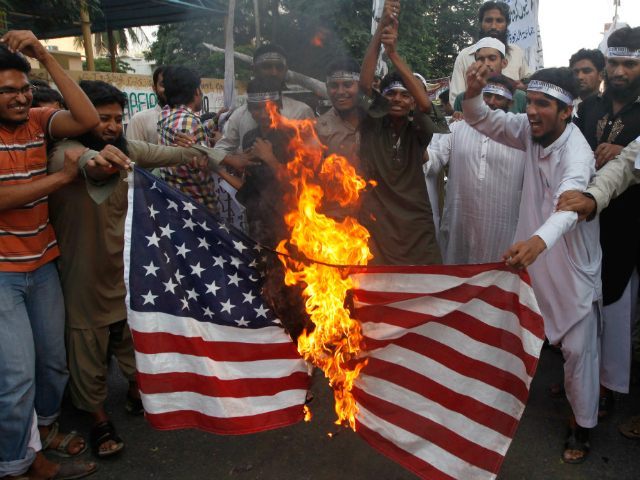“Maybe Donald Trump will do a great job, but you know, he scares me a little bit when he says all Muslims hate America,” said former Senator Tom Coburn of Oklahoma, during an interview with Breitbart News Daily on Thursday morning.
“That isn’t true,” Coburn continued. “What they hate is some of the behavior that our country has now embraced.”
He did not specify what that “behavior” might be, or why Muslims “hate” it.
The Trump comment to which Coburn refers was made during an interview with CNN’s Anderson Cooper on Wednesday evening. Cooper asked, “Do you think Islam is at war with the West?”
“I think Islam hates us,” Trump replied. “There’s something there… there’s a tremendous hatred there. There’s a tremendous hatred. We have to get to the bottom of it. There is an unbelievable hatred of us.”
“In Islam itself?” Cooper asked.
“You’re gonna have to figure that out, okay?” said Trump. “You’ll get another Pulitzer, right? But you’re gonna have to figure that out.”
“There is a tremendous hatred, and we have to be very vigilant, we have to be very careful, and we can’t allow people coming into this country who have this hatred of the United States, and of people who are not Muslim.”
Cooper asked if the war Trump described was between “radical” Islam or Islam in its entirety.
“It’s radical, but it’s very hard to define,” said Trump. “It’s very hard to separate, because you don’t know who’s who.”
“Look, these two young people that got married,” he continued, referring to the San Bernardino jihadis. “She supposedly radicalized him – who knows what happened? The bottom line is, they killed fourteen people. They gave them baby showers. I mean, they were friends of theirs, so they walked in and they killed them.”
“There’s an unbelievable hatred,” Trump repeated. “You look at Paris, 138 people killed. Many, many going to die in the hospital – mortally wounded, horribly wounded, horribly wounded. And they walk into a room and boom, boom, boom. There’s a sickness going on that’s unbelievable. And honestly, you have to get to the bottom of it.”
Although Trump’s comments have been treated as outrageous and beyond the pale, at some level he’s saying the same thing Coburn did, in a blunter and much broader way. Unless Coburn elaborates on precisely which American behavior he thinks Muslims “hate,” the difference between these two analyses is a matter of (considerable) degree.
Trump also said it was important to “figure out” why Islam is angry with the West and “get to the bottom of it,” which has been the official position of the U.S. government since shortly after the 9/11 attacks. Government and military personnel have been subjected to countless lectures on the topic, sometimes with a very poor choice of lecturer.
The distinction between “radical” and mainstream Islam is also a matter of official policy, repeated by nearly every politician in both major parties. Trump’s comments would suggest he thinks the radicals are much more numerous than the “tiny minority of extremists hijacking the Religion of Peace” talking point familiar in the post-9/11 era, and he’s bluntly asking if something about Islam makes radicalization easier than other religions. He is hardly the only person to ask that question, but major political figures rarely do it, nor do they use such indelicate language.
Trump is indisputably correct about the difficulty of separating radicals from the general population – a point often raised by critics of his proposed moratorium on Muslim immigration, which he appears to reference in this interview.
Intelligence and law enforcement agencies constantly speak of the difficulty of detecting radicals and intercepting them before they can launch terrorist attacks. Counter-terrorism officials frequently complain they lack the manpower to follow up on every lead.
For example, in a February 2015 interview with CNN, FBI counter-terrorism chief Michael Steinbach said his agency could not track all of the Americans who might journey overseas to fight with ISIS and return, and said it was simplistic to refer to the Islamist terror threat in America as “sleeper cells,” because the threat was more complex and diffuse than that. Steinbach also warned the FBI has seen children as young as 15 recruited by ISIS, sometimes with the encouragement of their parents.
Does anyone truly dispute Trump’s characterization of mass murders like San Bernardino and Paris as “sick” examples of “unbelievable hatred?”
The issue here is one of emphasis and choice of verbiage, which is surely important with Presidents and presidential candidates – talking is a big part of their job, and every word carries exceptional weight. The implication drawn from Trump’s words is that he thinks all, or most, of Islam hates the West and its values – a natural consequence of using words like “unbelievable” and “tremendous” to describe that hatred, and Trump’s refusal to employ the standard rhetorical hedge that he thinks only a very small number of Muslims harbor such feelings. The exact size and composition of the radical and radical-leaning population is one of the most important, and difficult, policy questions facing the Western world.
Trump, in short, entered a very delicate debate in a most indelicate way, and the sum of his remarks is more likely to generate outrage than most of his individual observations.
The “war with Islam” discussion begins about nine minutes into the CNN video clip of Trump’s interview below:
You can listen to Tom Coburn’s full interview with Breitbart News Daily below:

COMMENTS
Please let us know if you're having issues with commenting.